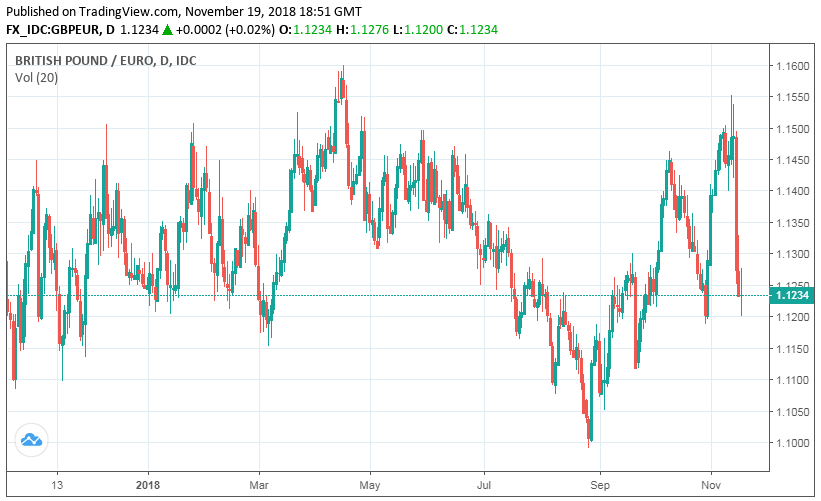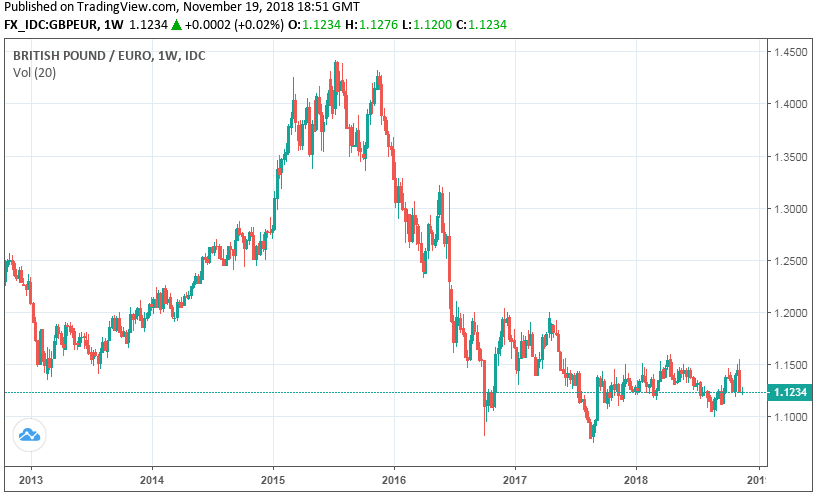Pound-to-Euro Rate going sub-1.10 as "May is Doomed" and New Election "Unavoidable" says Analyst
- Written by: James Skinner

Image © Flickr, Reproduced under CC Licensing
- Pound Sterling could return to post-referendum lows: Nordea Markets.
- Theresa May is the "walking dead" and unlikely to survive for long.
- Greater threat is a Corbyn government could now be "unavoidable".
The Pound-to-Euro rate could fall sharply during the weeks ahead as investors realise that Prime Minister Theresa May's Brexit plan is doomed and a new general election is unavoidable, according to a leading Scandanavian bank.
Strategists at Nordea Markets say to keep buying Euros and selling Pounds because the latest calamitous turn in the Brexit saga bodes ill for Sterling.
Prime Minister Theresa May does not have enough support to convert her Brexit agreement into law, and neither does anybody else have enough clout to get a different deal passed in the House of Commons and House of Lords.
This means the risk of a potentially disorderly Brexit, in which the U.K. leaves the EU without any formal agreement and defaults to trading with it on World Trade Organization terms, has risen in recent days.
It also means Sterling could be about to get clobbered by investors expressing their fears over the potential outcome of another election, which could see Labour Party leader Jeremy Corbyn become Prime Minister.
"We opted to go long EUR/GBP last week, as we found the market optimism surrounding a Brexit deal is too stretched. Here we are a week later with a 'walking dead' Theresa May," says Andreas Steno Larsen, a currency strategist at Nordea Markets.
Going 'long' the EUR/GBP rate is the same thing as selling the Pound-to-Euro rate.
"EUR/GBP could be headed as high as 0.91-0.92, if the full risk of a new Brexiteer-PM is priced in," says Larsen, making a call that could see the Pound-to-Euro rate fall as low as 1.0870.

Above: Pound-to-Euro rate shown at daily intervals.
PM May announced a deal covering terms of the U.K.'s withdrawal from the EU last week and although the agreement brings the nation a step close to an orderly withdrawal from the bloc, it prompted a rebellion among cabinet and backbench MPs.
They say the deal does not go far enough in delivering the spirit of the Brexit many may have voted for in June 2016.
The ensuing days saw the PM criticised by both sides of parliament and culminated in a wave of resignations from government on Thursday. It also drew calls from many influential MPs for a vote of confidence in the Prime Minister, with from some making clear that they want to oust her from office.
A realisation that the deal would struggle to come into force led to a notable sell-off in the British Pound. Rebel MPs are yet to secure sufficient support for a leadership contest.
"We stay long EUR/GBP, as we consider Theresa May doomed. There is no majority in favour of anything in the House of Commons, meaning that it is ultimately very hard to imagine any progress being made without a shakeup of the current composition of mandates. New elections are unavoidable," Larsen warns.

Above: Pound-to-Euro rate shown at weekly intervals.
Much has been written about the perceived dangers and damage that could befall the economy if the U.K. leaves the EU without some kind of agreement that ensures "frictionless" access to the bloc's goods and services markets.
But the bigger and relatively unforeseen danger could be in the threat posed by an openly Marxist Labour government.
An Opinium poll showed electoral support for the government slumping during the week that PM May's Brexit agreement became public, while the number of voters backing the opposition rose. The Labour Party now enjoys a lead over the government in this poll, suggesting it could win an election if one were held this week.
This thread from Robert re the DUP - this was always going to happen. There are only two outcomes to this mess, a new PM or a general election. Thanks to the disasterous ‘17 election - another TM calamity - No10 does not hold the winning cards. https://t.co/CDJS5atcUj
— Nadine Dorries (@NadineDorries) November 19, 2018
Labour MPs have frequently said the party would roll back the clock on government cuts to some areas of public spending and that they would raise tax rates aggressively too. In addition, and among other things, they've also pledged to nationalise water, energy, rail and postal services if if elected into office under Jeremy Corbyn
This would not only come at great cost to the public purse, if implemented to the letter, but could also risk sending the wrong message to international investors if the Party does not compensate them adequately for any assets nationlised.
When challenged over the potential cost of the nationalisation plan, shadow chancellor John McDonnell once floated the idea of buying shareholders out at "a discount", leading some to conclude a new government might attemp to cheat current investors out of some of their assets.
"Other things equal, employers’ labour costs would rise by £1bn per year under the Conservatives, and by £14bn per year under Labour – equivalent to 3.5% of firms’ annual gross profits. And the cost would be even bigger if it had a knock-on effect on workers higher up the pay scale," says Vicky Redwood, an economist at Capital Economics, in a note to clients outlining the potential implications of the deal.
Advertisement
Bank-beating exchange GBP/EUR rates. Get up to 5% more foreign exchange by using a specialist provider to get closer to the real market rate and avoid the gaping spreads charged by your bank when providing currency. Learn more here




